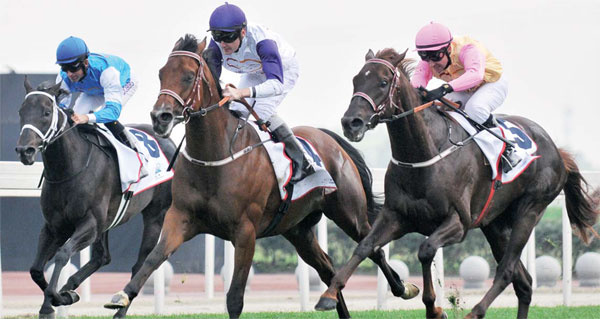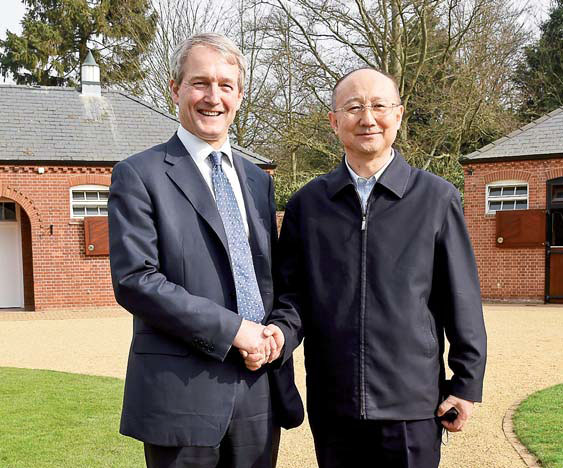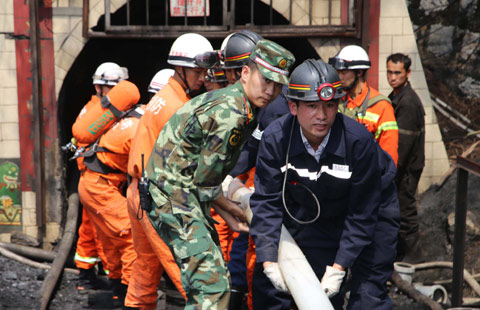An export of horses for courses
Updated: 2014-04-11 08:07
By Cecily Liu (China Daily Europe)
|
|||||||||||
|
Racehorses at April's Chengdu Dubai International Cup in Chengdu. Photos provided to China Daily |
|
Zhi Shuping, China's minister of the quality administration, and Owen Paterson, Britain's Environment Secretary. |
British equine industry looks set to find greener pastures in China
Some of the finest racehorses in Britain will soon be exported to China thanks to an agreement by the two governments this month.
Britain will now be allowed to export thoroughbreds and sports horses to China. France and Ireland had earlier signed similar agreements with China.
Horse exports to China could soon be worth 10 million pounds ($17 million, 12 million euros) a year to the British economy, the British government says.
Racehorse owners and associations in Britain have increasingly been eyeing the Chinese market, having witnessed growing demand in recent years.
In February last year, a delegation led by Paul Bittar, CEO of the British Horseracing Authority, visited China to initiate discussions with the country's horseracing industry.
Other organizations represented in the delegation included Great British Racing International, Ascot Racecourse, Racecourse Association and The Jockey Club.
The delegation visited Shanghai, Wuhan, Beijing and Tianjin and met officials and industry figures with a range of organizations including the Shanghai Race Club, the China Equestrian Association and the China Horse Industry Association.
A delegation from China's Ministry of Import Controls recently visited Britain to assess the possibility of establishing import process for racehorses.
They visited a number of facilities including the Newmarket Equine Hospital, Animal Health Trust and The National Stud to assess the health and conditions of racehorses for potential import.
Following a week-long investigation, the export agreement was signed between Zhi Shuping, China's minister of the General Administration of Quality Supervision, Inspection and Quarantine, and Owen Paterson, Britain's environment secretary, in Newmarket, a market town about 100 kilometers north of London.
"Riding, breeding and training horses are increasingly popular in China, so this deal will ensure that we can use the UK's world-famous thoroughbreds to boost our burgeoning equine industry," Zhi says.
Carter Carnegie, international executive of the industry association Great British Racing International, says: "The export of horses will become a major benefit to the British racing industry as China's interest in racing continues to grow.
"It is fitting that both ministers chose Newmarket, the birthplace of modern thoroughbred racing, to sign the deal as it showcases the very best the sport has to offer."
Newmarket is also significant in the horseracing industry because it is the home of Frankel, a British thoroughbred that ended an unbeaten career by winning the Champion Stakes at Ascot in October 2012.
During their time at Newmarket, Zhi and Paterson saw Frankel, now retired. It costs 125,000 pounds for him to service a mare.
Carnegie compares Frankel and British horseracing to watchmaking and Switzerland, the best in the world. Britain's racehorse breeds and the skills used in training racehorses have been passed down through history, he says.
The value of Britain's racehorse exports was 118 million pounds in 2012. Sales at Tattersalls, the bloodstock auctioneers, were worth 249 million guineas (237 million pounds).
Carnegie predicts that sales of racehorses to China will take off soon. In recent years, Great British Racing International has been contacted by Chinese parties needing help with building racecourses and establishing horseracing systems, he says.
So export agreement is a first step to engaging in the growing Chinese horseracing market, he says, and after Britain's racehorses start going to China, other help can follow.
Britain also has expertise in designing the governing structure for horseracing to ensure fair play and integrity, he says. It can also design and build racing venues, manage media coverage and design racing programs.
Professional horseracing first arrived in China with the establishment of early British expatriate communities in the middle 1800s. One legacy of this was the Shanghai Race Club, which remains a social racing club for wealthy Chinese racehorse owners competing in international races.
Gambling on horseracing is illegal on the Chinese mainland, and in 2008 the China Speed Horse Race Open in Wuhan was organized as a step toward legalizing horseracing.
Since then, the sport has rapidly grown. The first China Equine Cultural Festival was held in Hohhot, capital of the Inner Mongolia autonomous region, last year. This festival is expected to spread to several other cities this year, including Yantai, in Shandong province.
The opening up of China's horseracing industry has attracted great interest from businesses in many Western countries with established horseracing culture.
Irish company Coolmore secured a deal to help the northern city of Tianjin build a $2 billion national equine center in 2012. Singapore Turf Club is helping the China Horse Club of Tianjin to introduce the China Equine Culture Festival to Singapore later this year.
France has been trying to export its system of horserace betting to China. Philippe Germond, chief executive of the Paris-based betting operator PMU, told China Daily in a recent interview that he often travels to China hunting for business opportunities.
"If at some point in the future the Chinese government decides to legalize betting on horseraces, we can offer the French business model that may fit the expectations of the Chinese government," Germond said.
Hong Kong's horseracing industry has existed since colonial times. The Royal Hong Kong Jockey Club was established in 1884, and now conducts nearly 700 races every season at two race tracks.
Carnegie says he attended Hong Kong International Races in 2008 and 2013, and found them to be of a very high standard. Most of the racehorses in Hong Kong are imported from Britain.
Most Hong Kong buyers are high net worth individuals who come in at the top end of the price range for racehorses, Carnegie says.
"They don't buy cheap horses. They spend the time and money to buy high-end horses. I expect the mainland to do the same."
Normally Royal Hong Kong Jockey Club buys racehorses from Britain to re-sell to its members in Hong Kong, and in addition some individual members of the club travel to Britain to buy horses themselves, he says.
The two common types of purchases are one-year olds that have not competed in a race and are judged by their appearances and breeding; and second, horses that have won a race. Horses can be bought from auctions or privately from the owners, he says.
Tattersalls sold 86 horses worth a total of 7.765 million pounds to Hong Kong through its auctions in 2012.
As the first British racehorse is set to arrive in China, Britain's racehorse industry is becoming excited with the new opportunities.
Louise Kemble, CEO of the Thoroughbred Breeders' Association, says: "Whilst the opportunity for thoroughbred trade with China is in its infancy, the prospect of expanding this business meant that securing the export protocol was an essential first step for our members."
Claire Williams, of the British Equestrian Trade Association, says the protocol will open a new market to British horse exporters.
"It will also give a real boost to those companies developing markets in China for other related equestrian products."
cecily.liu@chinadaily.com.cn
(China Daily European Weekly 04/11/2014 page20)
Today's Top News
US health secretary resigns
China denies ransom demand
Wal-Mart to shut down its outlet in Hangzhou
Govt says no to short-term stimulus
European Council strips moscow of voting rights
Is Europe ready for Chinese tourists?
Sanpower aims to add firepower
An export of horses for courses
Hot Topics
Lunar probe , China growth forecasts, Emission rules get tougher, China seen through 'colored lens', International board,
Editor's Picks

|

|

|

|

|

|







